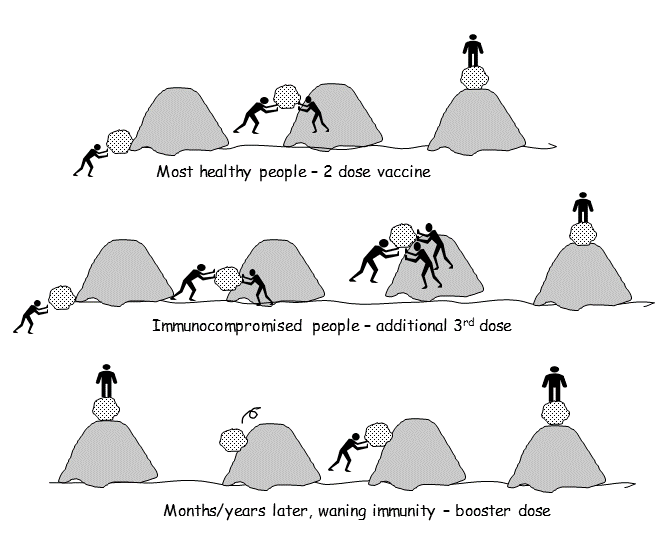A. It’s a subtle difference. A booster dose builds up waning immunity in people who made a good immune response to the first vaccine series. A third (or additional) dose helps people who did not make a good response to the first vaccine series and whose immune systems benefit from the additional dose.
👉🏽TL;DR. A primary vaccine series (e.g.; two dose COVID-19 mRNA vaccine) induces a good immune response in healthy people. However, some immunocompromised people do not make a good response to the primary vaccine series; therefore, a third dose might provide an extra nudge to their immune system, thus giving them additional protection. A booster dose is given when immunity built up from the primary vaccine series wanes over time. Booster doses shore up waning immunity.
➡️ How does the COVID-19 mRNA vaccine response work? COVID-19 mRNA vaccines are designed to educate the immune system to recognize SARS-CoV-2, develop immune memory, and prompt the immune system to protect us when we encounter the virus. COVID-19 mRNA vaccines currently follow a 2-dose regimen, with 3-4 weeks between the first and second dose. The first dose presents the immune system with the blueprint for SARS-CoV-2 spike protein and ‘PRIMES’ it to recognize spike protein if we encounter SARS-CoV-2. The immune response to this first dose of the vaccine is generally not very strong or sustained. The second dose of the vaccine ‘AMPLIFIES’ the immune response developed following the first dose. It also creates long term or ‘MEMORY’ responses. Vaccine-specific memory T and B cells are long-lasting and can multiply rapidly when needed. This is why completion of a 2-dose vaccine regimen is very important.
➡️ While most healthy people make a good response to COVID-19 mRNA vaccines, some people with compromised immune systems do not. Therefore, for these people a THIRD dose of the COVID-19 mRNA vaccine is recommended. These 3 doses form a primary vaccine series. The third dose is needed to push the immune system further to make a response that might be similar to the response in healthy people after 2 doses of the same vaccine.
➡️ BOOSTERS are defined as a vaccine dose given to people who have built up good immunity, but that immunity is now waning. An example of a booster vaccine is the Tdap (Tetanus, diphtheria, pertussis) or Td (tetanus, diphtheria) vaccines that most adults receive every 10 years. Tdap or Td boost the immune response that was developed to the first series of vaccines for tetanus, diphtheria and pertussis that are given during childhood.
❓ So, what’s the difference between a third dose and a booster dose? (See picture below.). Think of it like pushing a boulder up a hill – if we’re used to working out, we might be able to get the boulder to the top of the hill by ourselves (2-dose vaccine regimen that generates full immune response). Some of us might need an extra hand to get the boulder to the top (3-dose vaccine regimen). After a period of time, perhaps months or years later, what if the boulder starts rolling back down the hill? Well, we’d need a push to get it back to where it was (booster dose).

❓ What does this mean for the COVID-19 mRNA vaccines?
Currently, a THIRD dose of the mRNA vaccines is approved in several countries including the US and UK for people with compromised immune systems. This dose should be given no less than 28 days after the second dose. The three dose series is meant to help people with immunocompromised systems develop more robust immunity than with the two dose series. Unfortunately, so far no guidance has been released for immunocompromised people who received the one dose Janssen/Johnson and Johnson vaccine.
There is current (somewhat heated) discussion about the need for a booster dose in healthy people. An increasing number of breakthrough infections in vaccinated people *may* suggest that immunity is waning around 6-8 months following vaccination. But so far these data are murky since the people who got the vaccine first were the oldest and most vulnerable and thus might not reflect actual waning immunity. The results may also reflect the more transmissible Delta variant rather than true waning. Meanwhile, there is no evidence that effectiveness against hospitalization and death is waning. COVID-19 vaccine booster doses in the United States will require the FDA’s authorization and recommendation by the ACIP (the CDC’s Advisory Committee on Immunization Practices). These organizations are reviewing currently available data on the requirement for ‘boosters for all’.
💥 In the meantime, we should not lose sight of the fact that the current COVID-19 vaccines continue to provide EXCELLENT protection against infection in most people, and importantly, against severe COVID-19, many months after the initial vaccine doses.
Stay safe! Get vaccinated!
Love,
Those Nerdy Girls
Further reading:
Dear Pandemic on third dose for immunocompromised people
Dear Pandemic on boosters for all:
Should I take a booster shot if I am fully vaccinated?


